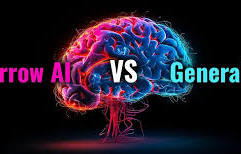Understanding General AI: The Future of Artificial Intelligence
Artificial Intelligence (AI) has rapidly evolved over the past few decades, transforming industries and reshaping how we interact with technology. While most current AI systems are designed for specific tasks, the concept of General AI, or Artificial General Intelligence (AGI), represents a more advanced stage of development. AGI refers to a type of AI that possesses the ability to understand, learn, and apply intelligence across a wide range of tasks, much like a human being.
What is General AI?
General AI is an aspirational goal in the field of artificial intelligence research. Unlike narrow AI, which excels at performing specific tasks such as language translation or facial recognition, General AI would have the capability to perform any intellectual task that a human can do. This includes reasoning, problem-solving, understanding complex ideas, learning from experience, and adapting to new situations.
The Challenges of Developing General AI
The development of AGI presents numerous challenges. One major hurdle is creating systems that can understand context and nuance in the way humans do. Current AI models often lack common sense reasoning and struggle with tasks that require understanding beyond predefined parameters.
Another challenge is ensuring safety and ethical considerations are addressed. As AGI could potentially surpass human intelligence, it raises questions about control and decision-making processes. Researchers are actively exploring ways to ensure that AGI systems align with human values and operate safely within society.
The Potential Impact of General AI
If successfully developed, General AI could revolutionize various sectors including healthcare, education, transportation, and more. In healthcare, AGI could lead to breakthroughs in personalized medicine by analyzing vast amounts of data to provide tailored treatment plans for patients.
In education, AGI could offer personalized learning experiences for students worldwide by adapting teaching methods to individual learning styles. Furthermore, transportation systems could become more efficient and safer through intelligent traffic management powered by AGI.
Current Progress and Future Prospects
While significant progress has been made in narrow AI applications, achieving true AGI remains a long-term goal for researchers worldwide. Some experts believe it may take decades before we see fully functional AGI systems; others are more optimistic about shorter timelines due to rapid advancements in machine learning techniques.
Organizations like OpenAI and DeepMind are at the forefront of researching pathways toward building safe and beneficial AGI systems. Collaborative efforts across academia and industry continue as researchers strive toward unlocking this next frontier in artificial intelligence technology.
Conclusion
The journey towards achieving General AI is both exciting and daunting due to its potential implications on society as a whole. As research progresses steadily forward amidst ongoing debates surrounding ethics & safety concerns – one thing remains clear: understanding & harnessing this powerful technology will require careful consideration & collaboration among scientists globally if we hope not only achieve but responsibly integrate such capabilities into our world effectively over time ahead!
Understanding General AI: Key Questions and Insights
- What is General AI?
- How does General AI differ from narrow AI?
- What are the challenges in developing General AI?
- What impact could General AI have on society?
- Are there ethical concerns surrounding General AI?
- Who is researching and developing General AI technology?
- When can we expect to see fully functional General AI systems?
What is General AI?
General AI, also known as Artificial General Intelligence (AGI), refers to a type of artificial intelligence that possesses the ability to understand, learn, and apply knowledge across a wide range of tasks, similar to human cognitive abilities. Unlike narrow AI, which is designed to perform specific tasks such as language translation or image recognition, General AI aims to replicate the versatility and adaptability of human intelligence. This means that an AGI system would be capable of reasoning, problem-solving, and learning from experience in various contexts without requiring task-specific programming. The development of General AI represents a significant challenge in the field of AI research, as it involves creating systems that can comprehend complex ideas and adapt to new situations with the same flexibility as humans.
How does General AI differ from narrow AI?
General AI, also known as Artificial General Intelligence (AGI), differs from narrow AI in its scope and capabilities. Narrow AI is designed to perform specific tasks or solve particular problems, such as voice recognition, language translation, or playing chess. These systems operate within a limited domain and are highly efficient at what they are programmed to do but lack the ability to generalize their knowledge beyond their specialized area. In contrast, General AI aims to mimic the broad cognitive abilities of humans, enabling it to understand, learn, and apply intelligence across a wide range of tasks and contexts. AGI would possess the flexibility to adapt to new situations, reason through complex problems, and exhibit common sense understanding—capabilities that narrow AI systems do not have. The development of AGI represents a significant leap forward in AI research, as it seeks to create machines with human-like intelligence that can perform any intellectual task that a human can do.
What are the challenges in developing General AI?
Developing General AI presents a multitude of challenges that span technical, ethical, and philosophical domains. Technically, one of the primary hurdles is creating systems that can understand and process information with the flexibility and depth of human cognition. This involves not only advanced machine learning algorithms but also the ability to reason, learn from minimal data, and adapt to new situations without explicit programming. Ethically, there are significant concerns about ensuring that AGI systems align with human values and operate safely within society. The potential for AGI to surpass human intelligence raises questions about control, decision-making authority, and the risk of unintended consequences. Additionally, philosophical challenges arise when considering consciousness and whether machines can truly possess understanding or awareness akin to humans. Addressing these challenges requires interdisciplinary collaboration among computer scientists, ethicists, psychologists, and policymakers to ensure that the development of AGI is both technically feasible and socially beneficial.
What impact could General AI have on society?
The impact of General AI on society could be profound and transformative, reshaping various aspects of daily life and industry. With its ability to perform any intellectual task that a human can do, General AI could revolutionize fields such as healthcare by providing highly personalized treatment plans and accelerating medical research. In education, it could offer tailored learning experiences that adapt to individual student needs, potentially reducing educational disparities. Economically, General AI might drive significant productivity gains and innovation, though it also raises concerns about job displacement and the need for workforce adaptation. Ethically and socially, the deployment of General AI necessitates careful consideration to ensure it aligns with human values and operates safely within societal frameworks. Overall, while the potential benefits are immense, they must be balanced with thoughtful management of risks and challenges.
Are there ethical concerns surrounding General AI?
The development of General AI raises significant ethical concerns that are widely debated among experts and ethicists. One of the primary concerns is the potential for AGI systems to surpass human intelligence, leading to questions about control and decision-making authority. There is apprehension about how these systems might be programmed to align with human values and ensure they act in ways that are beneficial rather than harmful. Additionally, there are fears regarding privacy, as AGI could have unprecedented access to personal data, raising issues about consent and data security. The potential for job displacement due to automation is another ethical consideration, as AGI could revolutionize industries and affect employment on a large scale. Ensuring transparency in how AGI systems operate and making sure they do not perpetuate or exacerbate existing biases are crucial challenges that need addressing as this technology continues to evolve.
Who is researching and developing General AI technology?
Several leading organizations and research institutions are at the forefront of developing General AI technology. Companies like OpenAI, DeepMind (a subsidiary of Alphabet), and IBM are heavily invested in advancing AI capabilities toward achieving Artificial General Intelligence (AGI). These organizations focus on creating AI systems that can perform a wide range of tasks with human-like understanding and adaptability. In addition to private companies, numerous universities and academic institutions worldwide are conducting significant research in this area, often collaborating with industry partners to push the boundaries of what AI can achieve. Governments and international bodies also play a crucial role by funding research initiatives and establishing guidelines to ensure the safe development of AGI. This collaborative effort aims to address the technical challenges involved while considering ethical implications and societal impacts.
When can we expect to see fully functional General AI systems?
Predicting the timeline for the development of fully functional General AI systems is challenging, as it involves significant scientific and technical hurdles. While some experts are optimistic and suggest that we might see AGI within a few decades, others believe it could take much longer due to the complexity of replicating human-like intelligence. The current focus in AI research is on advancing narrow AI capabilities, which excel at specific tasks but lack the generalization abilities of AGI. Progress in fields like machine learning, cognitive science, and neuroscience will be crucial in overcoming these challenges. Ultimately, while advancements continue to be made, there remains uncertainty about when AGI will become a reality, underscoring the need for continued research and collaboration across disciplines.




